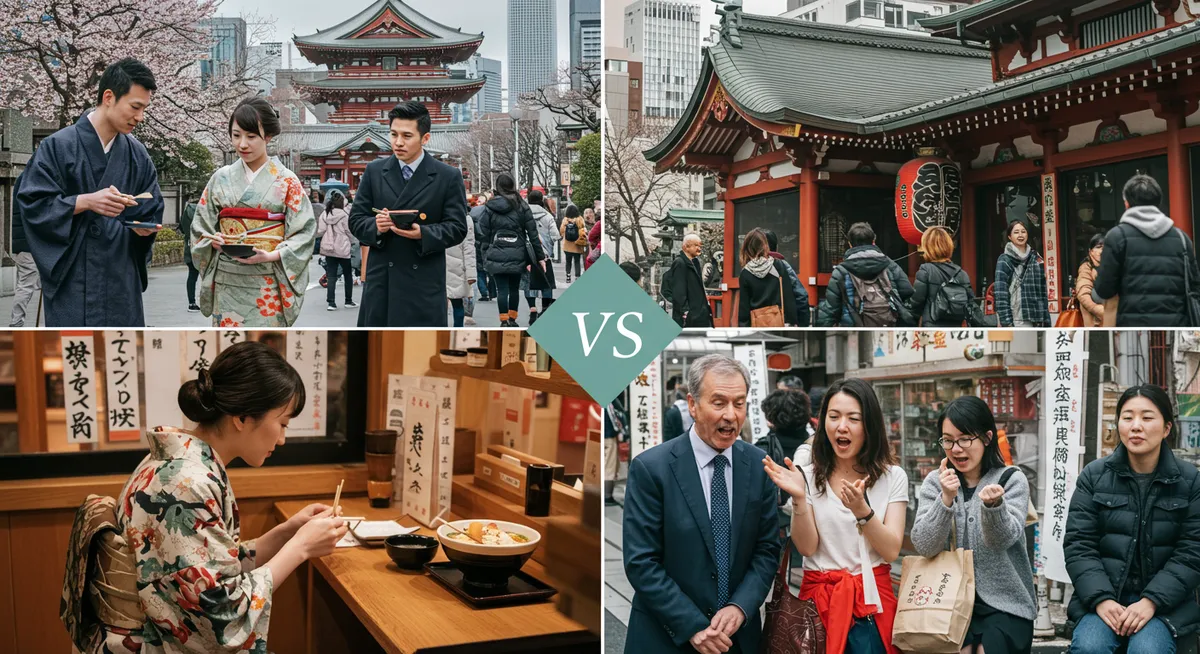
Tokyo Cultural Etiquette: Your Essential Dos & Don'ts
Table of Contents
Want to find the best travel deals for this destination? Chat with our travel hacking specialist!
Get Travel HacksCategory: tokyo-cultural-etiquette-dos-and-donts
Mastering Tokyo's Cultural Norms
Having spent years exploring Tokyo's vibrant neighborhoods and immersing myself in its rich traditions, I've learned firsthand that understanding cultural etiquette is key to a truly rewarding visit. Japan, and especially its bustling capital, Tokyo, thrives on respect, harmony, and subtle cues that can be easily missed by newcomers. This guide will walk you through the essential Tokyo cultural etiquette: dos and don'ts, ensuring you navigate social situations with grace and confidence. From bowing correctly to dining manners and public transport norms, mastering these simple yet profound practices will not only show your appreciation for the local culture but also unlock more authentic interactions. Get ready to embrace the warmth of Japanese hospitality!
Greetings & Communication Basics
Understanding the nuances of Japanese customs, particularly in greetings, is fundamental. The bow is central to Tokyo cultural etiquette; a slight nod suffices for casual encounters, while a deeper bow signifies respect. Always avoid direct eye contact that might seem aggressive, opting for a softer gaze. When you need to get someone's attention or apologize, a simple "Sumimasen" (excuse me/I'm sorry) is incredibly versatile and often used. Remember that personal space is valued, and loud conversations, especially on phones, are frowned upon in public. For a complete overview of navigating the city, check out our comprehensive Tokyo travel guide.
Dining & Table Manners
Dining in Tokyo is an exquisite experience, and observing proper dining norms enhances it. Always say "Itadakimasu" before eating and "Gochisousama deshita" after your meal to express gratitude. When using chopsticks, never stick them upright in your rice bowl, as this is associated with funerals. Pass food from chopstick to chopstick only if absolutely necessary, as it mirrors a similar funeral ritual. Slurping noodles is perfectly acceptable, even encouraged, as it shows enjoyment! Crucially, tipping is not part of Japanese cuisine traditions and can even be considered rude; service is already included. Plan your budget for culinary experiences by consulting our Tokyo travel budget breakdown.
Public Spaces & Transport Protocol
Adhering to public conduct rules is a cornerstone of Tokyo cultural etiquette. On public transport, especially trains, keep conversations low or silent to respect others. Always queue in an orderly fashion, whether for a train or a store. When entering someone's home, a traditional restaurant, or certain temples, remember to remove your shoes; you'll often find shoe lockers or designated areas. Littering is almost unheard of, so hold onto your trash until you find a bin, which can be surprisingly sparse. My personal tip: always prioritize silence on public transit; even phone calls are generally frowned upon. This is especially true if you are visiting during the best time to visit Tokyo when tourist numbers are high.
Shopping & Gifting Courtesy
Understanding consumer customs contributes significantly to positive interactions. When paying in shops, place your money or card in the small tray provided, rather than handing it directly to the cashier. Similarly, receive change or receipts with both hands as a sign of respect. Don't haggle over prices; fixed prices are standard. If you're giving a gift, present it with both hands and often a slight bow. It's polite for the recipient to initially refuse the gift once or twice before accepting. This shows humility and consideration. When exploring shopping districts, understanding these customs can help you navigate Tokyo's diverse neighborhoods more smoothly.
Frequently Asked Questions
Is tipping customary in Tokyo?
Do I need to bow in Japan?
Can I eat or drink on Tokyo's streets?
Mastering Tokyo cultural etiquette: dos and don'ts will significantly enhance your travel experience, transforming potential awkwardness into seamless interactions. From respectful greetings and mindful dining to quiet public transport and polite transactions, these small gestures show genuine appreciation for Japan's rich cultural fabric. Embracing these norms not only smooths your journey but also opens doors to deeper, more authentic connections with the local people. Armed with this knowledge, you're now better prepared to experience Tokyo with confidence and respect. Dive in and enjoy the wonders of this incredible city!